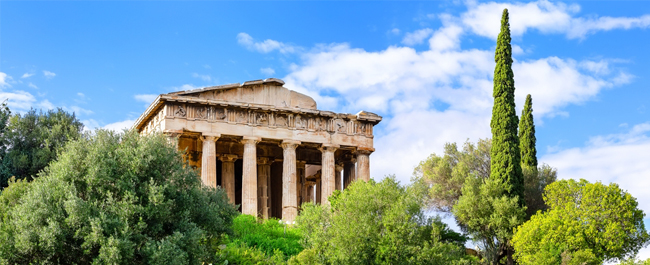The science of stories: Revitalising engagement with Classics

Research into ancient science-themed myths has revived interest in Classical subjects in schools.
Research highlights
- Created storytelling activities and resources used by schools across the UK.
- Introduced Classics into the curriculum of schools in the South West and Wales.
- Integrated Classics into teacher training at universities and visitor experiences in museums.
- Reversed the decline of Classics subjects at GCSE level.
Since the introduction of the National Curriculum in 1988, the teaching of Classics in the UK has been in steep decline,
Professor Genevieve Liveley has helped to reverse this trend with remarkable investigations into ancient storytelling and ancient, science-themed myths that have sparked the imaginations of pupils – particularly in state schools.
AI, robots and cyborgs
Professor Liveley’s work in this area centres on her findings that AI, robots and cyborgs unexpectedly play a role in classical myths, including:
- Cyborg slave girls made of gold and female living statues - anticipating modern mythmaking around sex and companion robots.
- A humanoid bronze giant Talos - a precursor to the 20th century Terminator character.
- Ships that ‘navigate by thought’ - anticipating the driverless cars of the 21st century.
Bringing Classics back to the classroom
After delivering a series of public lectures on these themes to teachers and students, Professor Liveley received a project grant from the charity Classics for All to set up a regional Hub for widening access to Classics in state schools.
Over a four your period the Hub worked with 105 schools across the South West and Wales - delivering workshops, training non-specialist teachers and providing new teaching resources
As a direct result of these efforts, more than 10,500 state school pupils in the South West and Wales were regularly studying Classical subjects in some form by 2020, with 15 schools introducing new Classics subjects at GCSE or A Level.
GCSE entries for Classics subjects increased by 6.6% between 2016 and 2020, reversing the decline of previous years.
The Science of Stories
Professor Liveley also worked with several schools to co-create The Science of Stories, a set of classroom resources designed to make ancient storytelling accessible and engaging for students.
The resources included an interactive flipbook, plus experiments, lesson plans and quizzes for use in a range of settings from science lessons and debate groups to extracurricular Classics clubs.
The impact of these resources, which have been used in schools from Aberdeen to Penzance, has been wide reaching and deep.
Teachers reported that the cross-curricular nature of the materials changed their teaching practices, helping them enrich their lessons and make connections between Classics, science and modern-day issues.
Enhancing teacher training
Professor Liveley’s work has similarly played a significant role in improving teacher training. She provided training for over 300 teachers and PGCE trainees, helping them incorporate storytelling and Classical myths into their teaching.
Three universities integrated these new approaches into their teacher training programmes, using Science of Stories resources to help non-specialist teachers introduce Classical subjects into English, science and foreign language lessons.
Broadening impact through museums
Professor Liveley’s research has further improved understanding of Classics through partnerships with museums.
At the We the Curious centre in Bristol, for example, she helped co-create new story-focused activities and curate public events that helped visitors understand how scientific concepts can be explored through classical myths.
The collaboration showed how the research has not only reversed the decline in Classics education. It has created a model for how storytelling can bridge the gap between sciences and the arts.
Teachers reported that the cross-curricular nature of the materials changed their teaching practices, helping them enrich their lessons and make connections between Classics, science and modern-day issues.
Connect with the researcher
Professor Genevieve Liveley, Professor of Classics, Department of Classics and Ancient History
Cite the research
- Liveley G and Thomas S (2020). Homer’s Intelligent Machines: AI in Antiquity, in Cave S, Dihal K and Dillon S (eds.) AI Narratives: A History of Imaginative Thinking about Intelligent Machines
- Liveley G (2019), Narratology. Oxford: Oxford University Press
- Liveley G (2019). Beyond the beautiful evil? The ancient/future history of sex robots, in Chesi GM and Spiegel F (eds.) Classical Literature and Post-Humanism, London: Bloomsbury